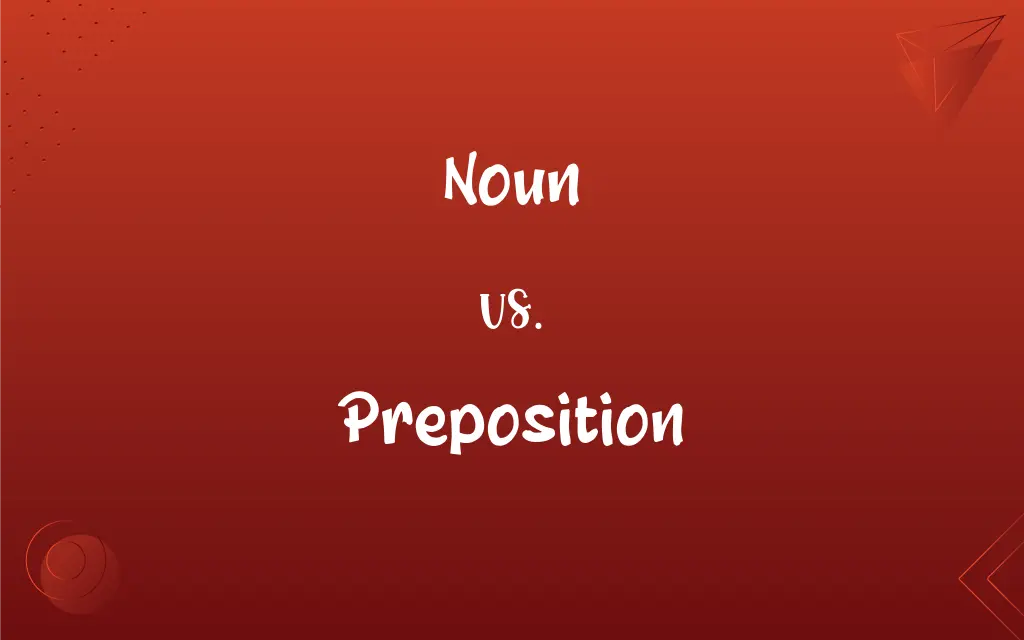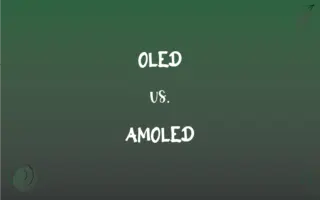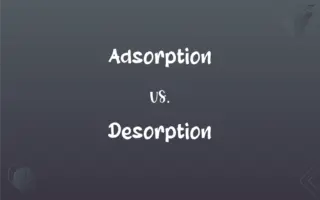Noun vs. Preposition: What's the Difference?
Edited by Aimie Carlson || By Harlon Moss || Published on December 21, 2023
A noun is a word that names a person, place, thing, or idea, while a preposition is a word that shows the relationship between nouns or pronouns and other elements in a sentence.

Key Differences
A noun is a fundamental part of speech that denotes a person, place, thing, or concept, such as 'dog', 'city', or 'happiness'. In contrast, a preposition is a word that links nouns, pronouns, or phrases to other words in a sentence to show time, location, direction, or method, like 'in', 'on', or 'by'.
Nouns can function as subjects, objects, or complements in a sentence, providing the main focus or participants in the sentence's action or state. Prepositions, however, serve to give additional information about the nouns, clarifying their roles or the circumstances of the action, without being the focal point themselves.
Nouns have properties like number (singular or plural) and case (subjective, objective, possessive). Prepositions do not change form but are crucial for constructing prepositional phrases, which modify nouns or verbs.
In English grammar, nouns can often be modified by adjectives or possessive forms to specify or emphasize. Prepositions, on the other hand, are fixed in form and often require the accompaniment of a noun or pronoun to form a complete prepositional phrase.
Nouns can sometimes be replaced by pronouns to avoid repetition or when the noun is understood, whereas prepositions always need to be explicitly stated to maintain the clarity of the relational context they provide in a sentence.
ADVERTISEMENT
Comparison Chart
Part of Speech Role
Names a person, place, thing, or idea
Shows relationships between elements
Sentence Function
Acts as subject, object, or complement
Forms prepositional phrases
Forms and Changes
Has singular/plural, can be possessive
Fixed form, doesn't change
Interaction with Other Words
Modified by adjectives or possessives
Connects with nouns or pronouns
Example
'Cat', 'happiness', 'New York'
'in', 'on', 'under', 'beside'
ADVERTISEMENT
Noun and Preposition Definitions
Noun
Nouns can be concrete, tangible objects or abstract concepts.
Love is a powerful emotion.
Preposition
Prepositions often indicate location in space or time.
Meet me at noon.
Noun
Nouns can be proper, naming specific entities, or common.
Paris is beautiful in spring.
Preposition
Prepositions are invariable and link elements.
She sat beside her friend.
Noun
A noun is a word for a person, place, thing, or idea.
The cat slept on the mat.
Preposition
A preposition shows the relationship of a noun or pronoun to other words.
The book is on the table.
Noun
Nouns can function as subjects or objects in sentences.
Technology has changed the world.
Preposition
Prepositions can indicate direction or movement.
She walked towards the park.
Noun
Nouns have number (singular/plural) and can be possessive.
Sarah's book is on the table.
Preposition
Prepositions are used to form phrases that modify nouns or verbs.
He is famous for his cooking.
Noun
The part of speech that is used to name a person, place, thing, quality, or action and can function as the subject or object of a verb, the object of a preposition, or an appositive.
Preposition
A word or phrase placed typically before a substantive and indicating the relation of that substantive to a verb, an adjective, or another substantive, as English at, by, with, from, and in regard to.
Noun
Any of the words belonging to this part of speech, such as neighbor, window, happiness, or negotiation.
Preposition
To position or place in position in advance
Artillery that was prepositioned at strategic points in the desert.
Noun
A word that functions as the name of a specific object or set of objects, such as person, animal, place, thing, phenomenon, substance, quality, or idea; one of the basic parts of speech in many languages, including English.
Preposition
Any of a class of non-inflecting words typically employed to connect a following noun or a pronoun, in an adjectival or adverbial sense, with some other word: a particle used with a noun or pronoun (in English always in the objective case) to make a phrase limiting some other word.
Noun
Either a word that can be used to refer to a person, animal, place, thing, phenomenon, substance, quality or idea, or a word that modifies or describes a previous word or its referent; a substantive or adjective, sometimes also including other parts of speech such as numeral or pronoun.
Preposition
An adposition.
Noun
(computing) An object within a user interface to which a certain action or transformation (i.e., verb) is applied.
Preposition
(obsolete) A proposition; an exposition; a discourse.
Noun
(transitive) To convert a word to a noun.
Preposition
To place in a location before some other event occurs.
It is important to preposition the material before turning on the machine.
Noun
A word used as the designation or appellation of a creature or thing, existing in fact or in thought; a substantive.
Preposition
A word employed to connect a noun or a pronoun, in an adjectival or adverbial sense, with some other word; a particle used with a noun or pronoun (in English always in the objective case) to make a phrase limiting some other word; - so called because usually placed before the word with which it is phrased; as, a bridge of iron; he comes from town; it is good for food; he escaped by running.
Noun
A word that can be used to refer to a person or place or thing
Preposition
A proposition; an exposition; a discourse.
He made a long preposition and oration.
Noun
A word that can serve as the subject or object of a verb
Preposition
A function word that combines with a noun or pronoun or noun phrase to form a prepositional phrase that can have an adverbial or adjectival relation to some other word
Preposition
(linguistics) the placing of one linguistic element before another (as placing a modifier before the word it modifies in a sentence or placing an affix before the base to which it is attached)
FAQs
What is a noun?
A word that names a person, place, thing, or idea.
What is a preposition?
A word that shows relationships between other words in a sentence.
Do prepositions change form?
No, prepositions are invariable.
Are there different types of nouns?
Yes, including proper, common, abstract, and concrete.
Can prepositions end sentences?
In modern usage, yes, especially in informal contexts.
Can prepositions be compound?
Yes, like 'according to' or 'because of'.
What is a prepositional phrase?
A phrase beginning with a preposition, including its object.
Are prepositions always necessary?
They are essential for expressing certain relationships and clarifying meaning.
Can a noun be plural?
Yes, most nouns have singular and plural forms.
Can a noun act as a subject?
Yes, nouns often function as subjects in sentences.
How do prepositions function in time?
They can indicate when something happens, like 'before' or 'after'.
Can a noun be an object?
Yes, nouns can be direct or indirect objects in sentences.
What's an example of an abstract noun?
Words like 'freedom' or 'happiness'.
What are common preposition mistakes?
Incorrectly using them or omitting necessary ones.
Do prepositions have synonyms?
Yes, like 'on' can be similar to 'upon'.
Are prepositions hard to learn for ESL students?
They can be challenging due to their abstract nature.
What are possessive nouns?
Nouns that show ownership, often with an apostrophe and 's'.
Can nouns be replaced by pronouns?
Yes, to avoid repetition or when the noun is clear.
How do nouns function in possessive form?
They show ownership or association.
What is a collective noun?
A noun that denotes a group, like 'team' or 'flock'.
About Author
Written by
Harlon MossHarlon is a seasoned quality moderator and accomplished content writer for Difference Wiki. An alumnus of the prestigious University of California, he earned his degree in Computer Science. Leveraging his academic background, Harlon brings a meticulous and informed perspective to his work, ensuring content accuracy and excellence.
Edited by
Aimie CarlsonAimie Carlson, holding a master's degree in English literature, is a fervent English language enthusiast. She lends her writing talents to Difference Wiki, a prominent website that specializes in comparisons, offering readers insightful analyses that both captivate and inform.































































